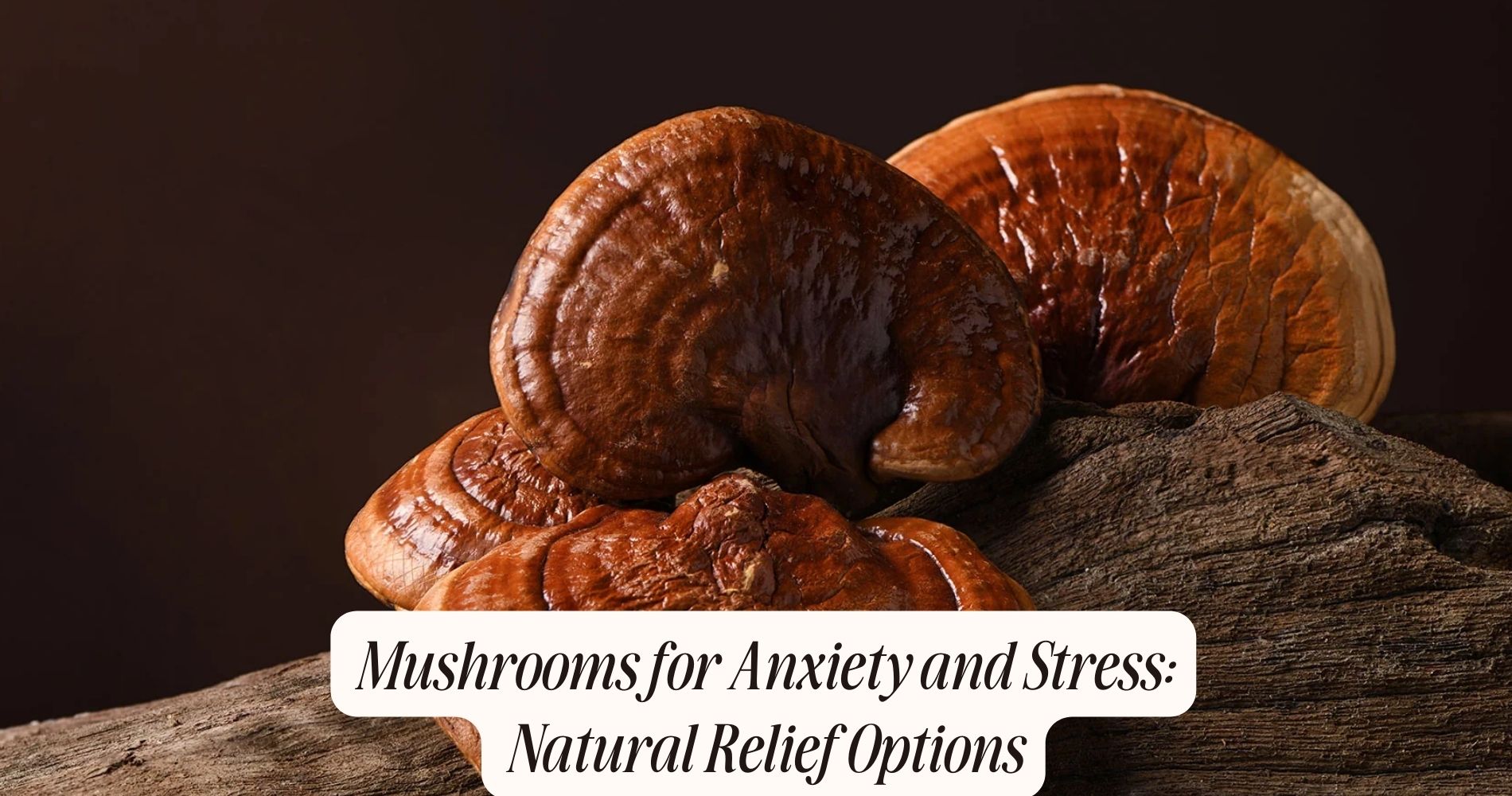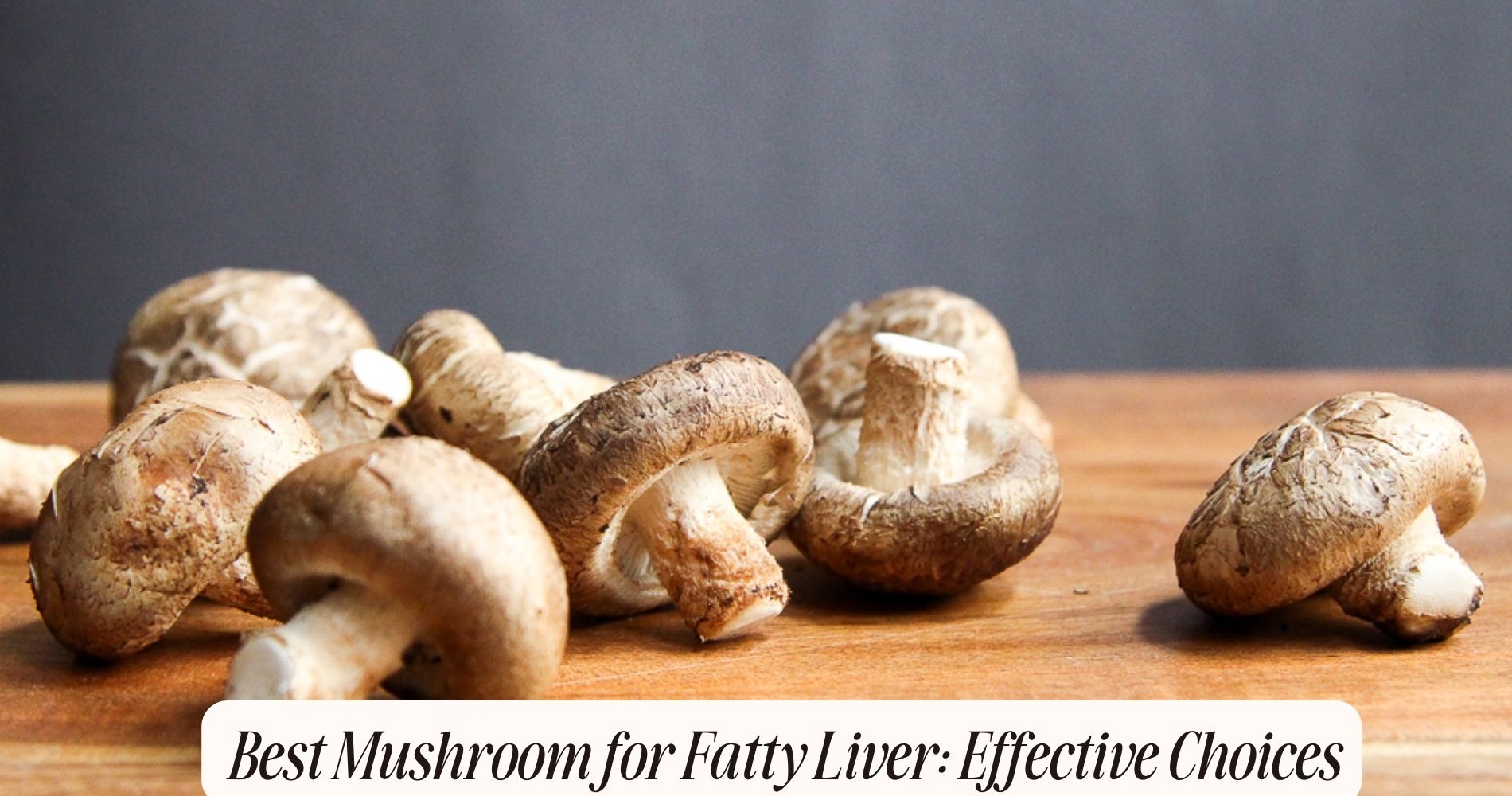
Mushrooms for Anxiety and Stress: Natural Relief Options
Reishi Mushroom Benefits
Reishi mushrooms, known scientifically as Ganoderma lucidum, have been extensively studied for their potential to reduce anxiety and stress. Their adaptogenic properties are a significant focus of this research.
Adaptogens help the body adapt to stressors, balancing physiological processes and promoting homeostasis. Reishi mushrooms are particularly noted for their ability to modulate the body's stress response.
Scientific studies indicate that reishi mushrooms can reduce cortisol levels, the hormone most commonly associated with stress. Lower cortisol levels can lead to a decrease in anxiety symptoms.

Additionally, these mushrooms contain compounds like triterpenoids and polysaccharides, which have been shown to exhibit anti-anxiety and anti-depressive effects. These compounds work by influencing the production and regulation of neurotransmitters such as serotonin and dopamine, which are essential for mood stability.
Moreover, reishi mushrooms have been found to support the immune system, which is often compromised during periods of chronic stress. By boosting immune function, these mushrooms further help the body manage stress more effectively.
Their adaptogenic properties make them a valuable addition to any natural regimen aimed at reducing anxiety and stress.
Lion's Mane for Nerves
You might find Lion's Mane beneficial for nerve health due to its ability to boost cognitive function and enhance mood stability.
Studies show that it can naturally reduce inflammation, which is essential for maintaining a healthy nervous system.
Incorporating Lion's Mane into your regimen may offer a multifaceted approach to managing anxiety and stress.
Boosts Cognitive Function
How can Lion's Mane mushrooms enhance cognitive function and support nerve health?
Research indicates that Lion's Mane contains compounds such as hericenones and erinacines, which promote neurogenesis and neuroprotection. These compounds stimulate the production of nerve growth factor (NGF), essential for the maintenance and regeneration of neurons. By doing so, they directly contribute to cognitive enhancement and memory improvement.
In clinical studies, participants who consumed Lion's Mane showed significant improvements in cognitive tests compared to those who did not. For instance, a 2009 study in the journal Phytotherapy Research found that older adults with mild cognitive impairment experienced enhanced cognitive function after taking Lion's Mane supplements for 16 weeks. This evidence suggests that Lion's Mane can be particularly beneficial for age-related cognitive decline.
Furthermore, Lion's Mane's anti-inflammatory properties play a role in protecting brain cells from damage. Chronic inflammation is a known contributor to various neurodegenerative diseases. By reducing inflammation, Lion's Mane helps preserve neural integrity and function.
Enhances Mood Stability
Lion's Mane mushrooms have shown promise in enhancing mood stability by modulating the nervous system. Research indicates that these mushrooms can promote the growth of nerve cells, which may improve your brain's ability to manage stress and anxiety. By fostering neurogenesis, Lion's Mane aids in maintaining a balanced emotional state, making it an effective tool in mood stabilization techniques.
Clinical studies suggest that the bioactive compounds in Lion's Mane, such as hericenones and erinacines, play a role in reducing depressive symptoms. These compounds appear to support the synthesis of nerve growth factor (NGF), essential for the health of neurons. This support translates into improved emotional resilience strategies, helping you to better cope with stressors.

Incorporating Lion's Mane into your diet or supplement regimen could be a practical approach to enhancing mood stability. While more extensive human trials are needed, existing evidence points to its potential benefits for those struggling with anxiety and stress. Always consult with a healthcare professional before starting any new supplement, to guarantee it aligns with your overall health strategy.
Reduces Inflammation Naturally
In addition to its mood-stabilizing properties, Lion's Mane also naturally reduces inflammation, which is essential for maintaining nerve health and overall well-being.
Scientific studies have demonstrated that Lion's Mane contains compounds such as hericenones and erinacines, which exhibit significant anti-inflammatory properties. These compounds inhibit the production of pro-inflammatory cytokines, thereby reducing inflammation at the cellular level.
For those seeking natural remedies to manage anxiety and stress, reducing inflammation is vital. Chronic inflammation can exacerbate symptoms of anxiety and stress, making it more difficult to achieve mental balance. By incorporating Lion's Mane into your regimen, you can target the inflammation that may be contributing to your symptoms.
Furthermore, inflammation in the nervous system has been linked to neurodegenerative diseases such as Alzheimer's and Parkinson's. The anti-inflammatory properties of Lion's Mane not only help in reducing anxiety but also offer protective benefits for long-term nerve health.
This dual action makes it a valuable addition to your natural remedies toolkit. Clinical research continues to support the efficacy of Lion's Mane in reducing inflammation, positioning it as a potent, natural option for those aiming to improve their mental and physical well-being.
Cordyceps and Energy
Cordyceps mushrooms have been shown to enhance energy levels by improving oxygen utilization and increasing cellular ATP production. This process directly contributes to an energy boost, making Cordyceps an effective option for those looking to enhance their physical performance and stamina.
Clinical studies indicate that the cordyceps benefits extend to increased endurance, which can be particularly beneficial for individuals experiencing fatigue due to stress or anxiety.
Research demonstrates that Cordyceps can help optimize the body's oxygen efficiency, which is essential for maintaining high energy levels, especially during physical exertion. By increasing the production of adenosine triphosphate (ATP), the primary energy carrier in cells, Cordyceps assists in sustaining energy reserves and improving overall vitality.
Moreover, the antioxidant properties of Cordyceps contribute to reducing oxidative stress, which can otherwise impair cellular function and energy production. The combined effects of improved oxygen utilization, ATP production, and antioxidant activity underscore the potential of Cordyceps to provide a natural energy boost.
Chaga for Mental Clarity
Chaga mushrooms have been shown to support mental clarity by promoting cognitive function and reducing inflammation in the brain. Research indicates that chaga benefits include antioxidant properties that combat oxidative stress, a factor known to impair cognitive functions. Consuming chaga regularly may help you maintain sharper mental faculties by reducing the oxidative damage that can contribute to conditions like brain fog and memory issues.
One practical and popular way to incorporate chaga into your routine is through chaga tea. This beverage allows for easy absorption of the mushroom's beneficial compounds. Studies highlight that the anti-inflammatory properties of chaga can help lower neuroinflammation, a condition linked to cognitive decline and various mental health issues. By alleviating inflammation, chaga tea may support clearer thinking and better focus.

Additionally, chaga's polysaccharides have been shown to enhance mental clarity by optimizing neural pathways. These compounds help improve brain function by supporting cellular communication and energy production within the brain. The cumulative effect of these chaga benefits can help you experience improved mental clarity and a more focused mind, making it a valuable addition to your wellness regimen.
Turkey Tail's Immune Support
While chaga mushrooms enhance mental clarity, turkey tail mushrooms offer significant immune support through their potent bioactive compounds. These fungi are rich in polysaccharopeptides, particularly PSP and PSK, which have been shown to modulate the immune system.
Clinical studies suggest that these compounds can enhance the activity of natural killer cells, a critical component of your body's defense mechanism. When you incorporate turkey tail into your regimen, you may notice an improvement in your immune response.
Research indicates that the bioactive compounds in turkey tail can increase the production of immune cells and improve their ability to combat infections. This effect can be particularly beneficial if you're dealing with chronic stress, as prolonged stress is known to weaken the immune system.
Moreover, turkey tail mushrooms have demonstrated antioxidant properties, which help reduce oxidative stress. By lowering oxidative stress, these mushrooms assist in maintaining a balanced immune system.
Scientific studies support their role in improving gut health, which is closely linked to immune function. Including turkey tail in your daily routine could, consequently, provide a multifaceted approach to enhancing your overall well-being and resilience against illnesses.
Maitake's Calming Effects
Derived from the Grifola frondosa fungus, maitake mushrooms have been shown to possess compounds that may help alleviate anxiety and promote a sense of calm.
Research indicates that maitake extract contains bioactive polysaccharides, specifically beta-glucans, which have potential anxiolytic effects. These compounds interact with the body's immune system and endocrine pathways, potentially reducing stress levels and enhancing mood stability.
Several studies have examined the calming properties of maitake mushrooms. One investigation found that subjects consuming maitake extract exhibited lower cortisol levels, a key stress hormone. Reduced cortisol levels are often associated with decreased anxiety and improved emotional well-being.

Additionally, maitake extract has been observed to influence neurotransmitter activity, particularly serotonin and dopamine, which play critical roles in mood regulation.
Moreover, the adaptogenic properties of maitake mushrooms contribute to their effectiveness in stress management. Adaptogens help the body adapt to stress and restore physiological balance. By modulating the body's response to stressors, maitake mushrooms may help prevent the onset of anxiety symptoms.
Dosage and Safety Tips
When considering mushrooms for anxiety and stress, it's essential to follow recommended daily intake guidelines to avoid adverse effects.
You should be aware of potential side effects, such as gastrointestinal discomfort or allergic reactions.
Adhering to safe usage guidelines guarantees you benefit from their therapeutic properties without compromising your health.
Recommended Daily Intake
To enhance the benefits of mushrooms for anxiety and stress, it's crucial to adhere to recommended daily dosages and follow established safety guidelines.
Daily recommendations for mushrooms like Reishi, Lion's Mane, and Cordyceps generally range from 1 to 3 grams, depending on the specific type and form (e.g., dried, extract, or powder). For the best intake, it's advisable to start with the lower end of the dosage range and gradually increase it, monitoring your body's response.
Before incorporating mushrooms into your routine, consult with a healthcare provider, especially if you're pregnant, breastfeeding, or taking other medications. This guarantees the dosage aligns with your individual health needs and mitigates risks of potential interactions.
When sourcing mushrooms, opt for high-quality products from reputable suppliers to avoid contaminants.
Adhering to these daily recommendations can help you achieve the desired therapeutic effects while minimizing risks. Remember to keep a consistent schedule for intake, as sporadic use may reduce efficacy.
Monitoring your symptoms and adjusting the dosage as needed, under professional guidance, guarantees a safe and effective approach to managing anxiety and stress with mushrooms.
Potential Side Effects
While adhering to recommended dosages can maximize benefits, it's also important to be aware of potential side effects associated with mushroom consumption for anxiety and stress.
One concern is mushroom toxicity, which can occur if you consume wild mushrooms that haven't been properly identified. Symptoms of mushroom toxicity range from gastrointestinal distress to more severe neurological effects, depending on the species ingested.
Additionally, allergic reactions are a potential side effect. Although rare, some individuals may experience skin rashes, itching, or respiratory issues after consuming certain types of mushrooms. If you have a known allergy to fungi or mold, exercise caution and consult a healthcare provider before incorporating mushrooms into your regimen.
Moreover, gastrointestinal disturbances such as nausea, vomiting, or diarrhea can occur, particularly if the mushrooms are consumed in large quantities. It's essential to start with a low dose and gradually increase it, monitoring your body's response to mitigate adverse effects.
To guarantee safety, only use mushrooms from reputable sources and avoid self-foraging unless you have expert knowledge in mycology. Always consult a healthcare professional before starting any new supplement, especially if you have pre-existing conditions or are taking other medications.
Safe Usage Guidelines
Guaranteeing the safe and effective use of mushrooms for anxiety and stress involves adhering to recommended dosages and following well-established safety guidelines.
First, consult a healthcare professional before beginning any new supplement, especially if you're pregnant, nursing, or taking other medications. Proper dosage varies depending on the type of mushroom, so follow the manufacturer's instructions or your healthcare provider's recommendations.
Usage precautions are essential. Start with the lowest possible dose to gauge your body's reaction and gradually increase it if needed. Avoid combining mushrooms with alcohol or other psychoactive substances, as this may amplify side effects. Regularly monitor your response to the supplement and report any adverse effects to your healthcare provider immediately.
Mushroom sourcing is another important consideration. Purchase mushrooms from reputable suppliers to guarantee quality and purity. Look for third-party testing and certification to confirm that the product is free from contaminants and accurately labeled.
Wild mushrooms should never be consumed unless you're an expert in mushroom identification, as some species can be toxic.
Frequently Asked Questions
Can Mushrooms Interact With Prescription Anxiety Medications?
Yes, mushrooms can interact with prescription anxiety medications. You should consult your doctor about specific mushroom types and follow dosage guidelines to avoid adverse effects and guarantee safe, effective integration with your current treatment plan.
Are There Side Effects From Using Mushrooms for Anxiety?
Yes, using mushrooms for anxiety can have side effects. Different mushroom types may cause digestive issues or allergic reactions. Follow dosage guidelines to minimize risks and consult a healthcare provider before starting any new supplement.
How Long Does It Take to Feel the Effects of These Mushrooms?
You'll typically feel the effects of specific mushroom types within 30 minutes to 2 hours. Onset time varies based on the mushroom type, dosage, and individual metabolism, but most people report noticeable effects within this timeframe.
Are There Dietary Restrictions While Consuming Medicinal Mushrooms?
You should be aware of potential dietary restrictions when consuming medicinal mushroom varieties. Certain consumption methods, like raw or powdered forms, may interact with medications or cause digestive issues. Always consult your healthcare provider for personalized advice.
Can These Mushrooms Be Taken in Combination With Other Natural Supplements?
You can take mushroom blends with other natural supplements, but consult a healthcare provider first. They can assess supplement synergy and potential interactions. This guarantees safety and maximizes the effectiveness of your supplement regimen.
Conclusion
Incorporating mushrooms like Reishi, Lion's Mane, Cordyceps, Chaga, Turkey Tail, and Maitake into your routine can offer natural relief for anxiety and stress.
These mushrooms provide a range of benefits, from enhancing mental clarity and energy levels to supporting immune function and calming nerves.
Always consult a healthcare professional for appropriate dosages and safety considerations.
With evidence-based support, these fungi could be a valuable addition to your wellness regimen.




